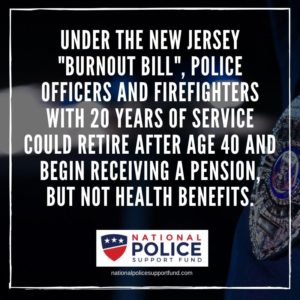A proposal making its way through New Jersey’s legislature would allow police officers and firefighters to retire after 20 years of service, citing the extreme physical and mental toll the profession can have.
While this seems like a way to recognize and reward the dedication that these individuals have to their jobs and the work they put into keeping their communities safe, the reality is more complicated and has divided police unions and local governments.
Under the current system, someone must be at least 55 years old before they can retire and receive a pension and health insurance from New Jersey Police and Fireman’s Retirement System (PFRS). Under the proposed plan, anyone with 20 years of service could retire after age 40 and begin receiving a pension, but not health benefits.
At the hearing where the bill was introduced, Rob Nixon, a lobbyist for the New Jersey State Policemen’s Benevolent Association, said the bill’s goal is to recognize the immense physical and mental toll that comes with being a first responder. To him, the “burnout bill” is a no-brainer.
“In some ways, it’s a frustration that we’re even here talking about this,” Nixon said, according to NJ Spotlight. “This bill basically recognizes the stress of the job.”

According to PFRS estimates, 6,881 employees would be eligible to retire before age 55 under the new system, which would increase pension payments by more than $400 million. However, a similar law passed in 2000, and only about 1% of eligible police officers have taken advantage of it.
Robert Gries, executive vice president of the New Jersey State FOP, said he hopes that the proposed changes would provide relief to officers and their families and give them support to make an otherwise difficult decision to step away from the force.
“With law enforcement suicides being so high over the past five years, a five-year early out advantage would likely save some lives of some of our heroes in blue,” Gries said.
While the “burnout bill” could help individual officers and their families, budget analysts caution that it could hurt the entire pension fund in the long run. The PFRS is currently about 70% funded, which does not include market downturns related to COVID-19. Additionally, the assumed rate of return is expected to fall from 7.3% to 7% next year, which would increase the amount needed to meet current retiree needs.
Lori Buckelew, senior legislative analyst at the New Jersey State League of Municipalities, said the PFRS should be on more stable financial footing before opening it up to potentially thousands of new withdrawals.
“We really need to get our fund healthy because it helps not only us as employers, but it helps the fund members as well,” Buckelew said.
The bill was introduced in the New Jersey legislature in early March, just before the outbreak of COVID-19. Given the disruptions and other priorities related to the pandemic, it’s unclear when the “burnout bill” could become law in New Jersey or what the final version of the proposal could look like.
Before COVID-19 hit, cities across the country were considering changes to bail bond programs that, in some cases, would make it easier for people convicted of violent crimes to obtain bail and return to the streets. Let’s take a closer look at some of the bail reform measures being taken around the country and why they are putting police in danger. Read more here.









